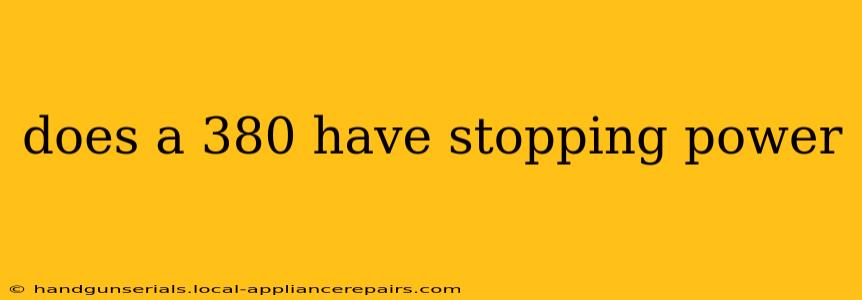Does a .380 Have Stopping Power? A Comprehensive Look at Caliber Effectiveness
The question of whether a .380 ACP (Automatic Colt Pistol) cartridge possesses sufficient "stopping power" is complex and lacks a simple yes or no answer. Stopping power isn't solely determined by caliber; it's a multifaceted concept influenced by several factors. This article delves into the specifics, examining the .380's capabilities and limitations, and providing a nuanced perspective informed by ballistic science and real-world considerations.
Understanding "Stopping Power": More Than Just Caliber
The term "stopping power" often refers to a round's ability to immediately incapacitate a threat. However, this is a misleading simplification. True incapacitation depends on several key factors:
-
Shot Placement: Precise shots to vital organs (brain, heart, spinal cord) are paramount, regardless of caliber. A perfectly placed .380 round will be far more effective than a poorly placed larger round.
-
Bullet Expansion/Fragmentation: A bullet's ability to expand upon impact, creating a larger wound cavity, significantly increases its incapacitating potential. .380 ammunition varies in this regard, with some rounds designed for better expansion than others.
-
Bullet Penetration: Sufficient penetration is crucial to reach vital organs. Too little penetration, and the bullet may not cause sufficient damage. Too much penetration, and the bullet may pass through without causing sufficient trauma.
-
Energy Transfer: The amount of energy transferred to the target upon impact contributes to the overall effect. While .380 has less energy than larger calibers, adequate energy transfer is still possible with proper shot placement and bullet design.
-
Caliber and Projectile Weight: While caliber is a factor, the weight of the bullet itself also plays a role in energy transfer. A heavier .380 bullet will transfer more energy than a lighter one.
The .380 ACP: Strengths and Weaknesses
The .380 ACP is a relatively small caliber, offering several advantages:
-
Concealability: Its compact size makes it ideal for concealed carry, fitting easily into smaller firearms.
-
Recoil: The lower recoil allows for quicker follow-up shots, which is crucial in self-defense situations.
-
Ammunition Availability: .380 ACP ammunition is widely available and relatively affordable.
However, it also has limitations:
-
Limited Energy Transfer: Compared to larger calibers like 9mm or .45 ACP, the .380 has less kinetic energy upon impact.
-
Penetration Limitations: While sufficient for close-range encounters, the penetration capabilities might be insufficient against thick clothing or barriers.
Choosing the Right Cartridge: Context Matters
The suitability of a .380 ACP depends heavily on the intended use. For concealed carry in situations requiring a lightweight, easily concealable option, the .380 can be effective, especially when using ammunition designed for better expansion. However, individuals seeking maximum stopping power might opt for larger calibers.
The .380's effectiveness is not inherently limited by its size; rather, it's reliant on factors such as accurate shot placement, proper ammunition selection, and the individual's training and proficiency with the firearm. Extensive practice and training are vital to maximizing the effectiveness of any firearm, regardless of caliber.
Conclusion: A Nuanced Perspective
There's no definitive answer to whether a .380 has "stopping power." Its effectiveness is contingent on various factors beyond just the cartridge itself. Responsible firearm ownership includes understanding these factors, choosing appropriate ammunition, and rigorously practicing marksmanship. Consult with firearms experts and consider professional training to make informed decisions regarding self-defense weaponry. Remember, responsible gun ownership is paramount.

